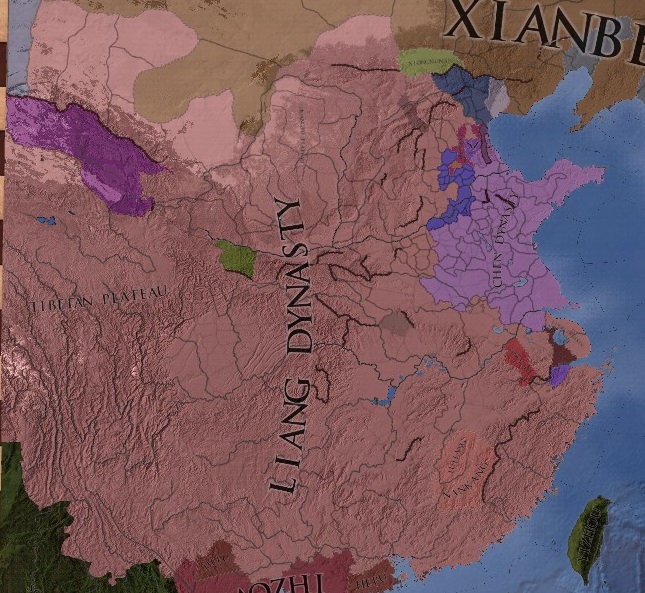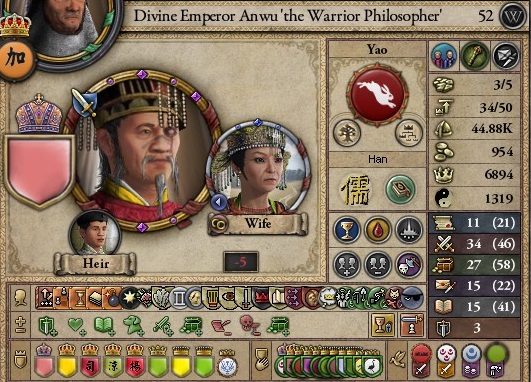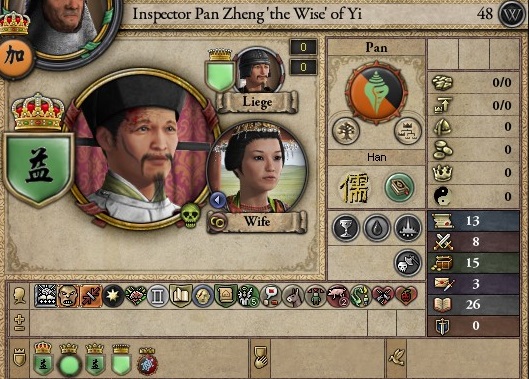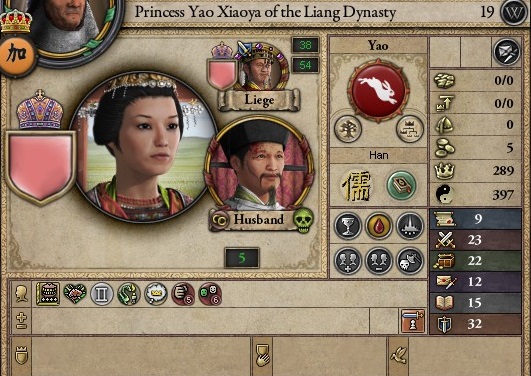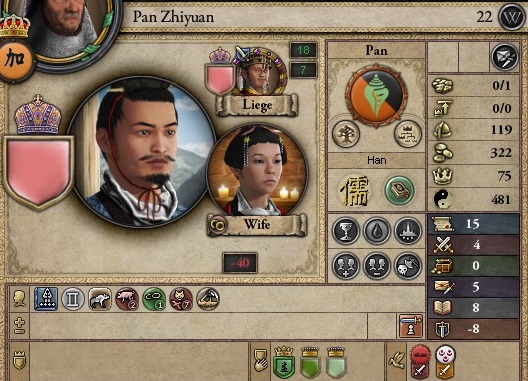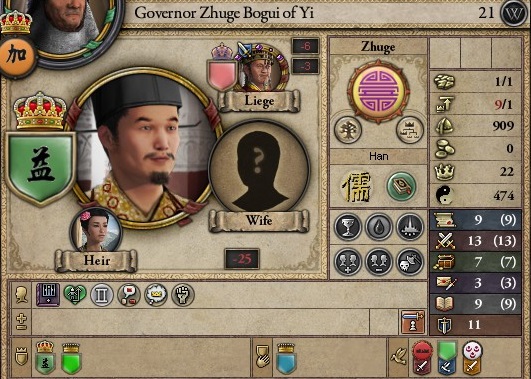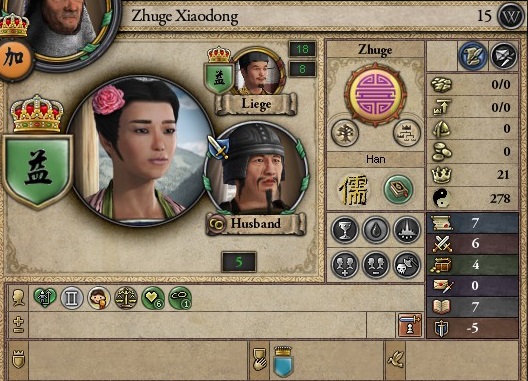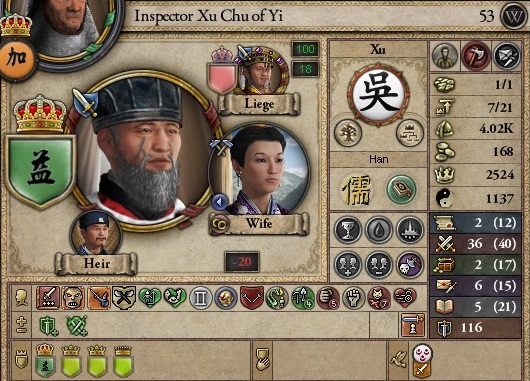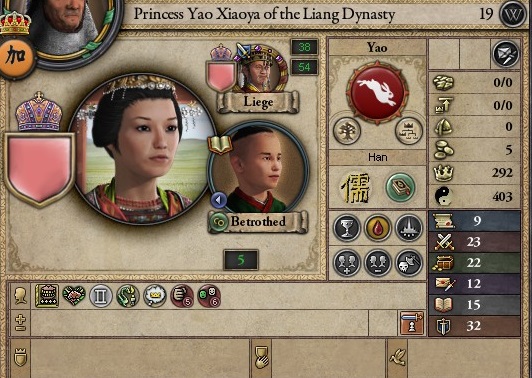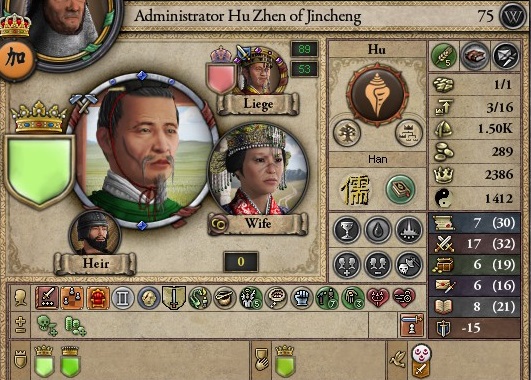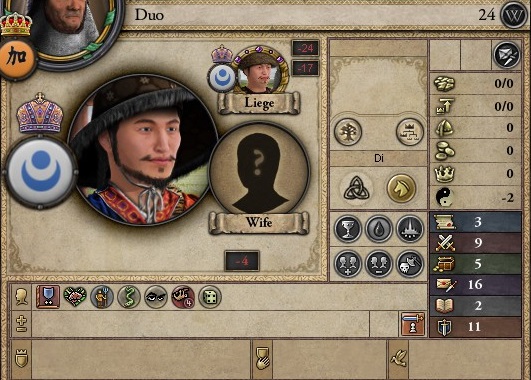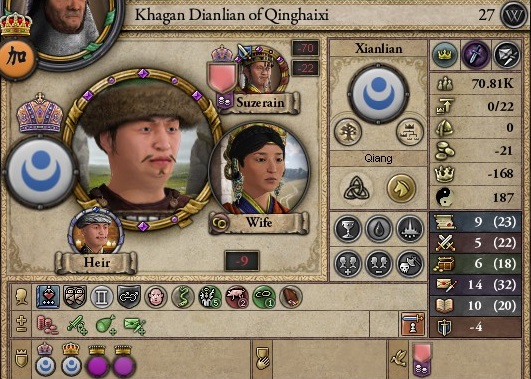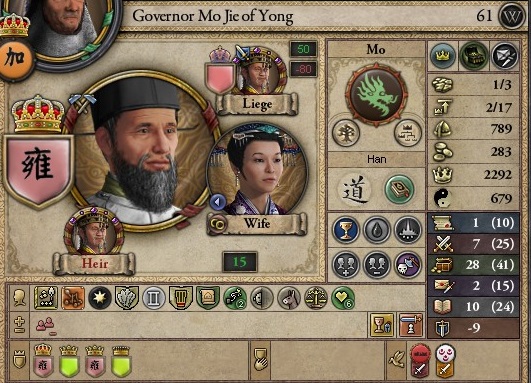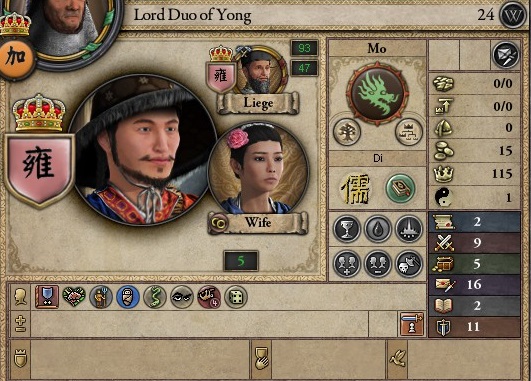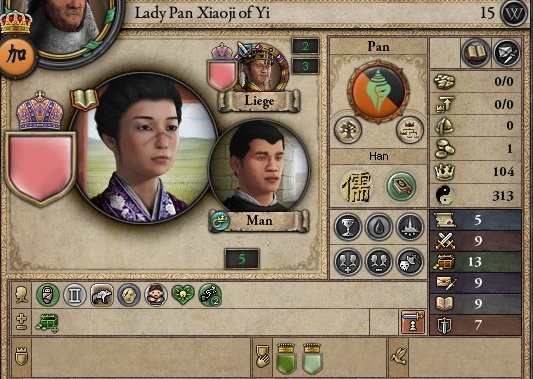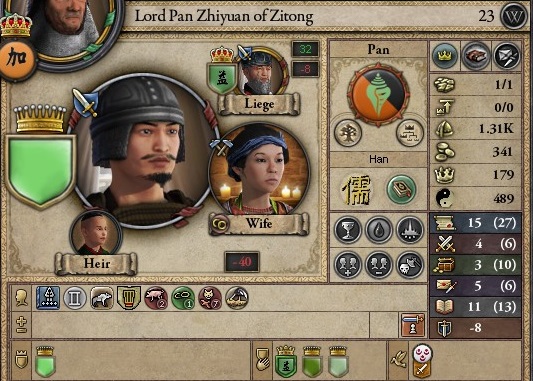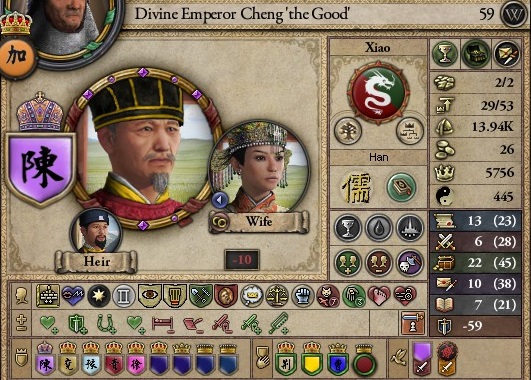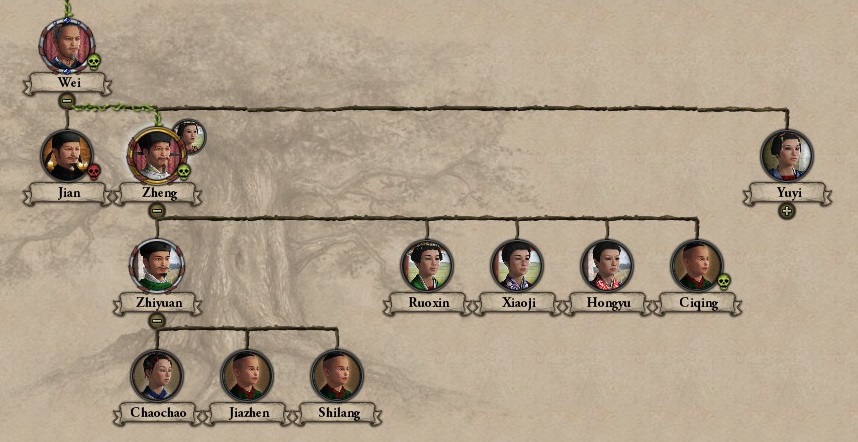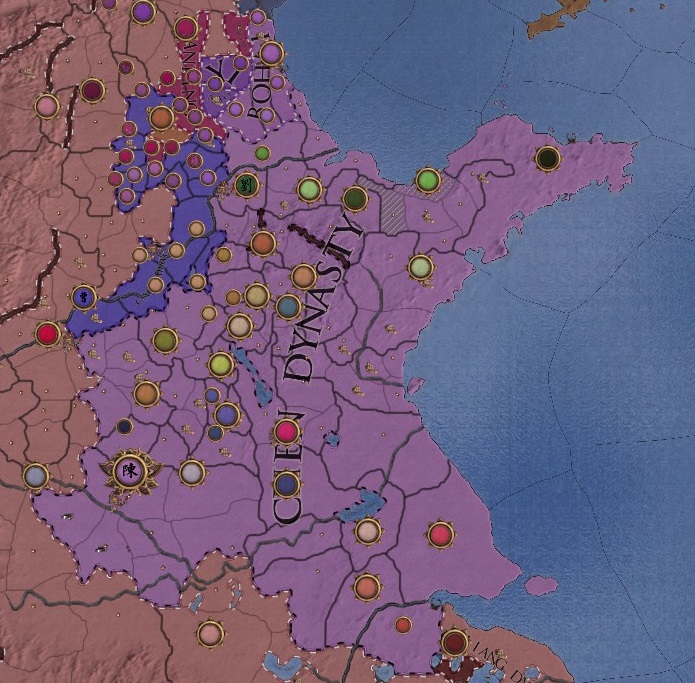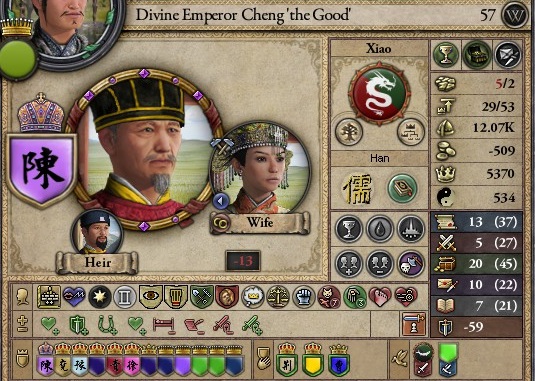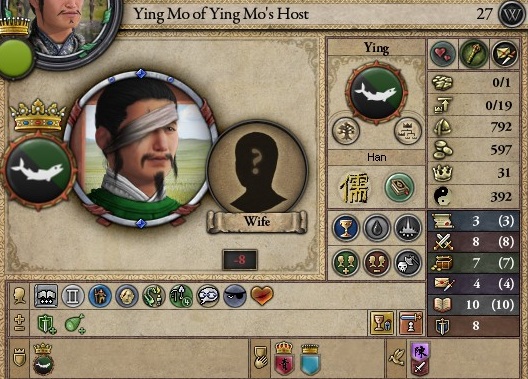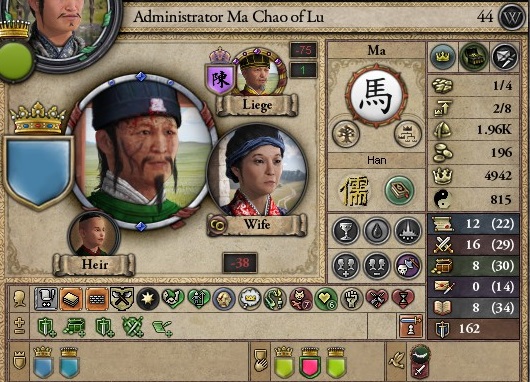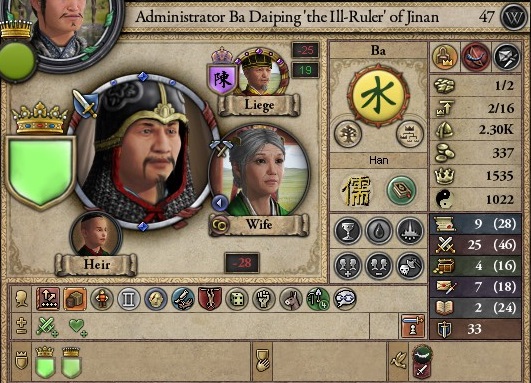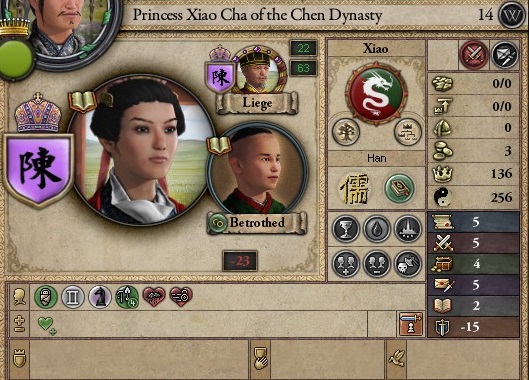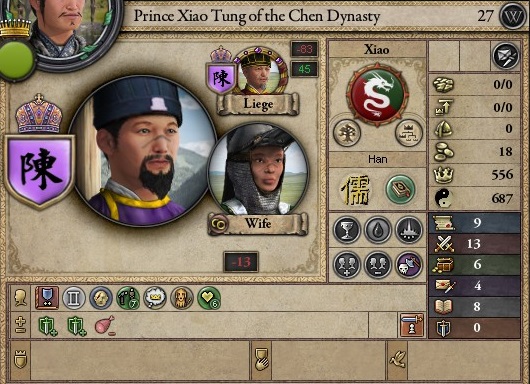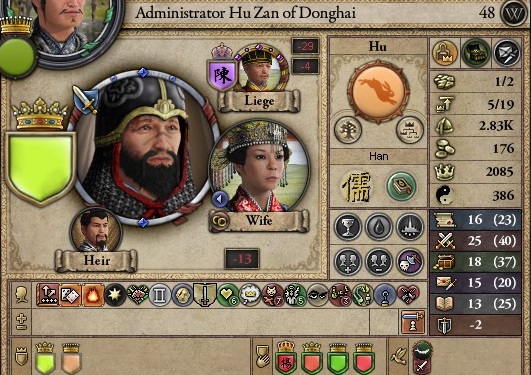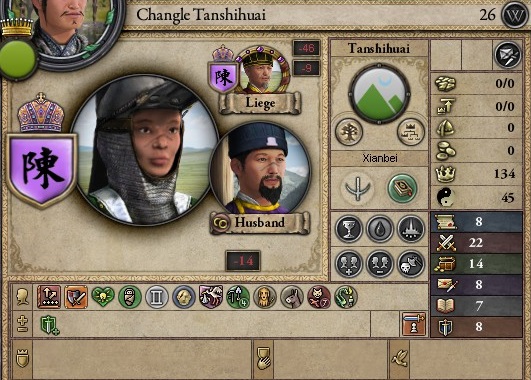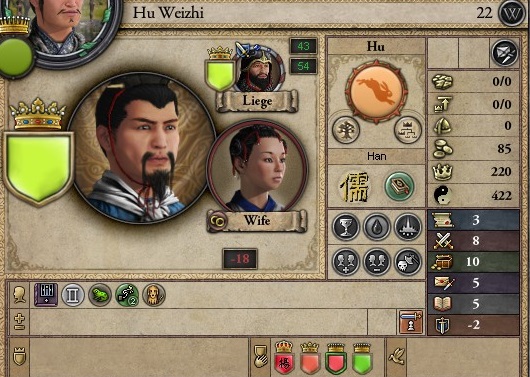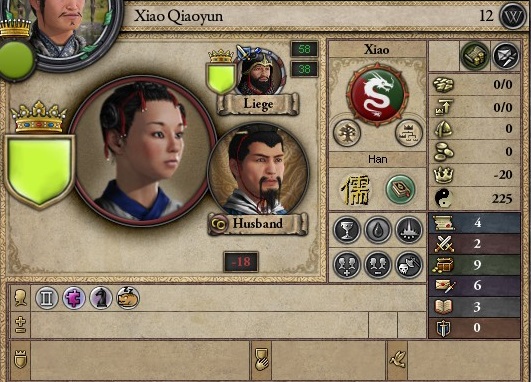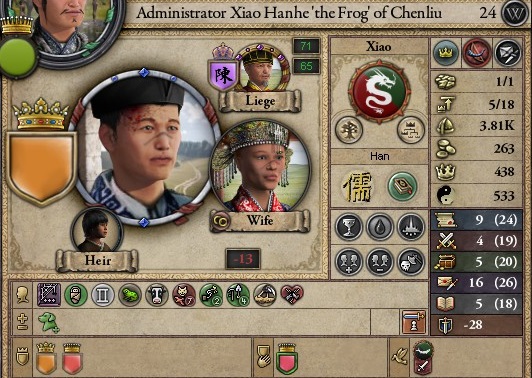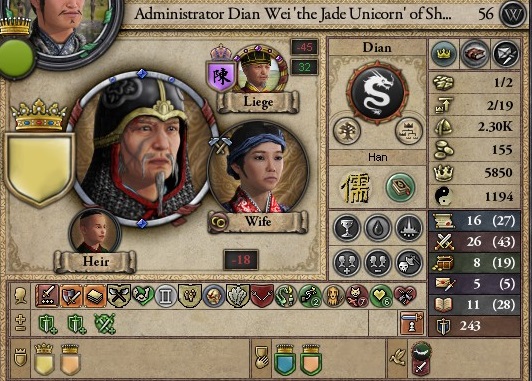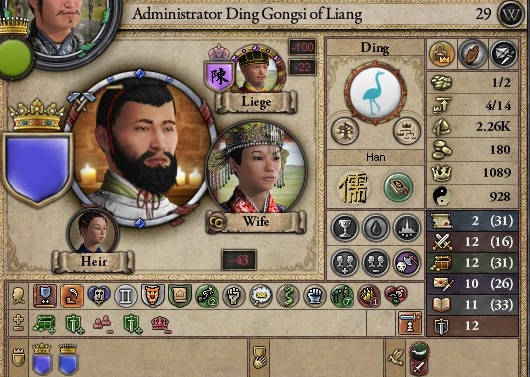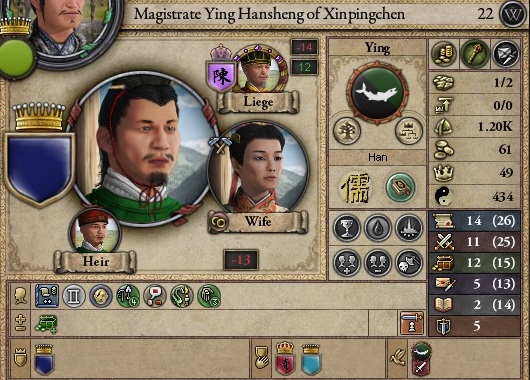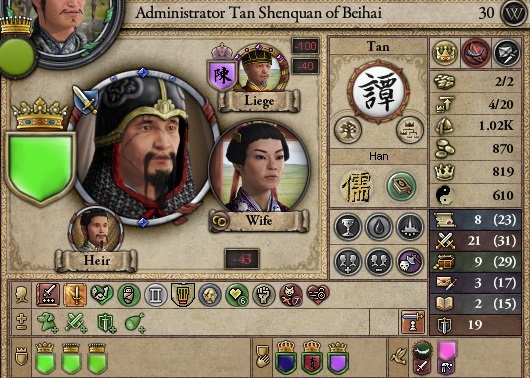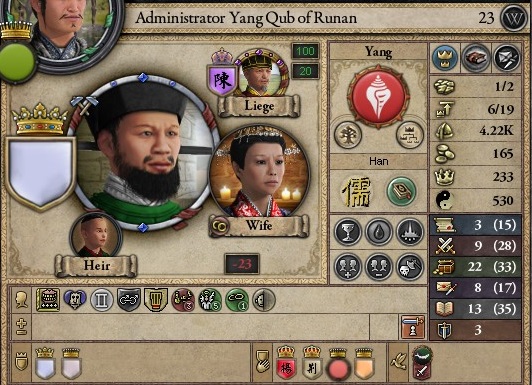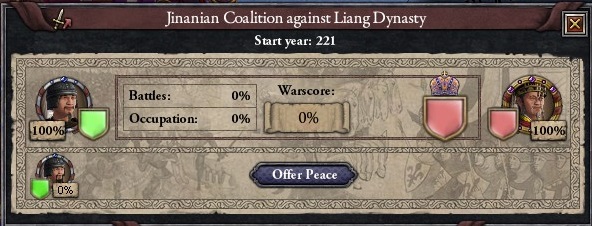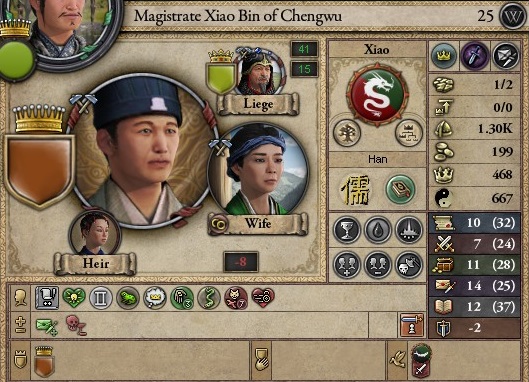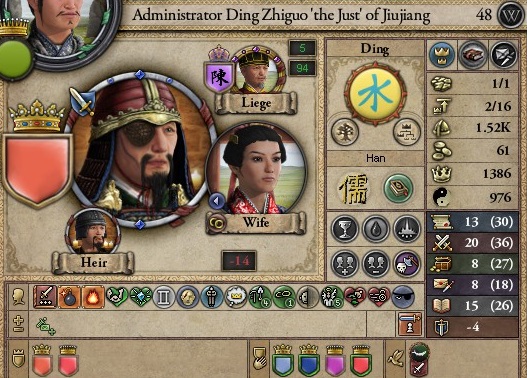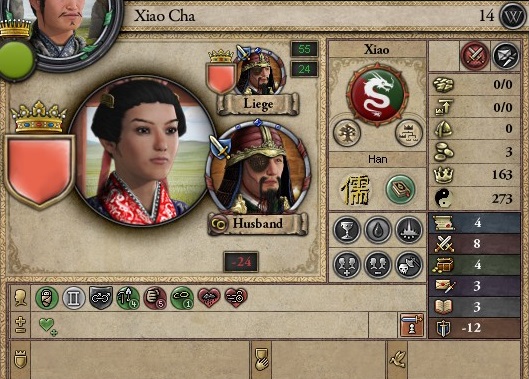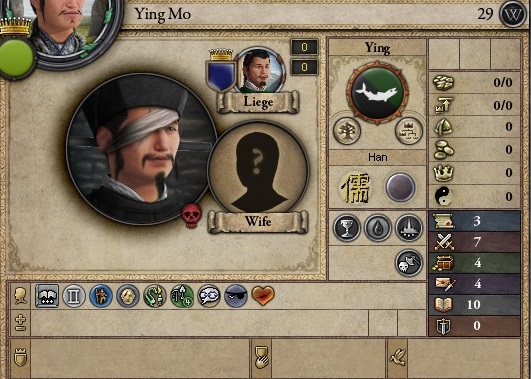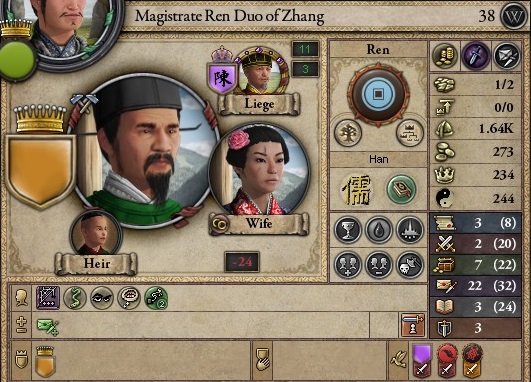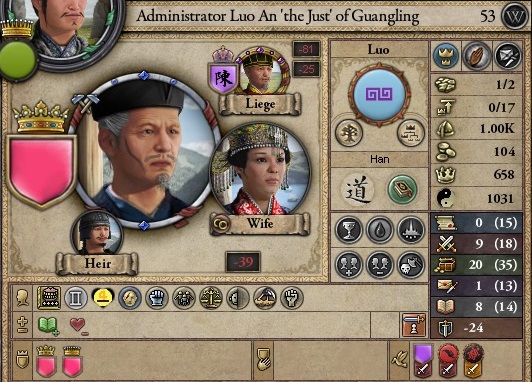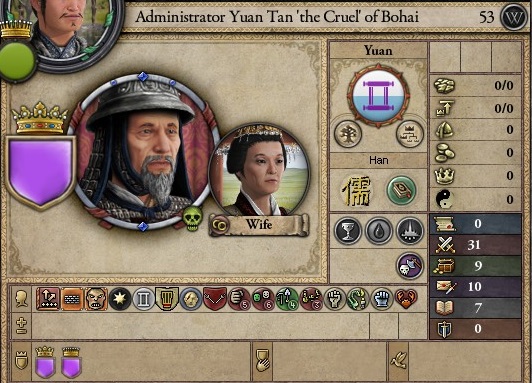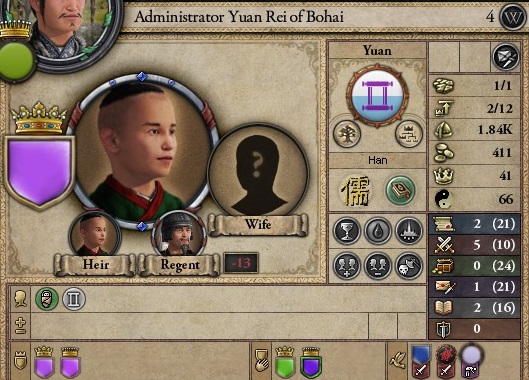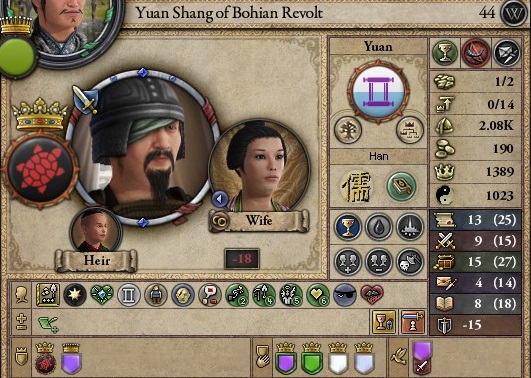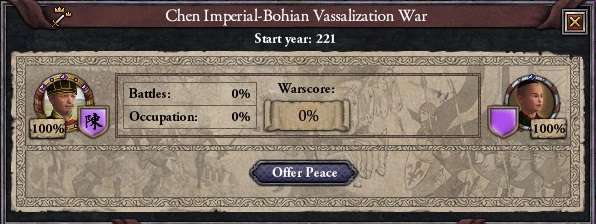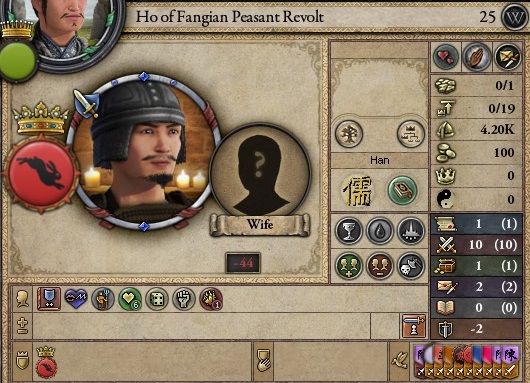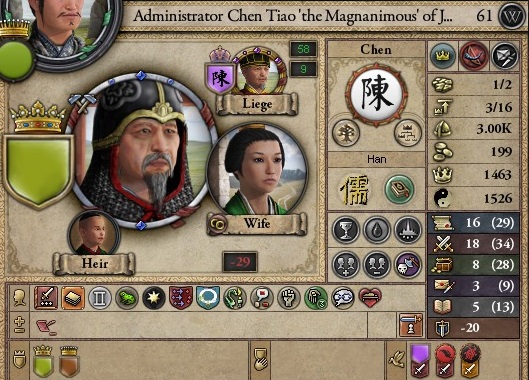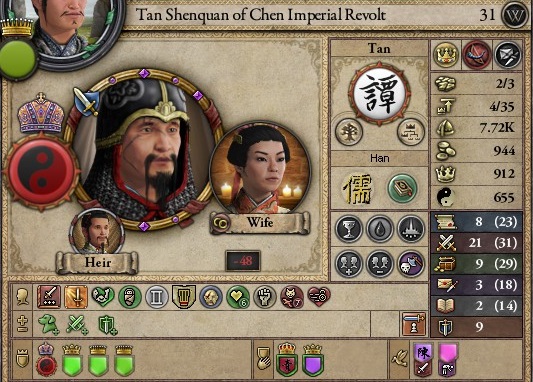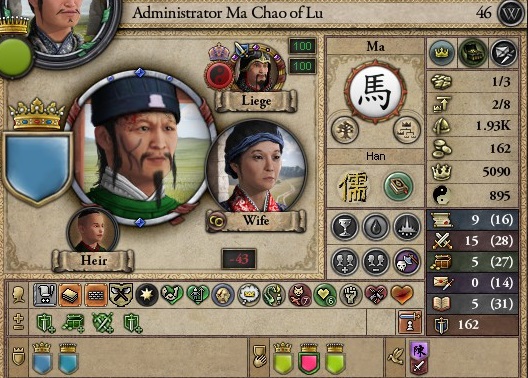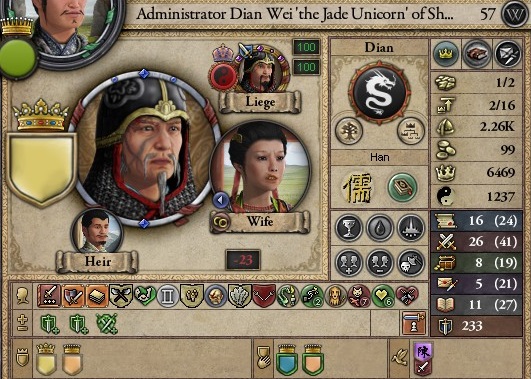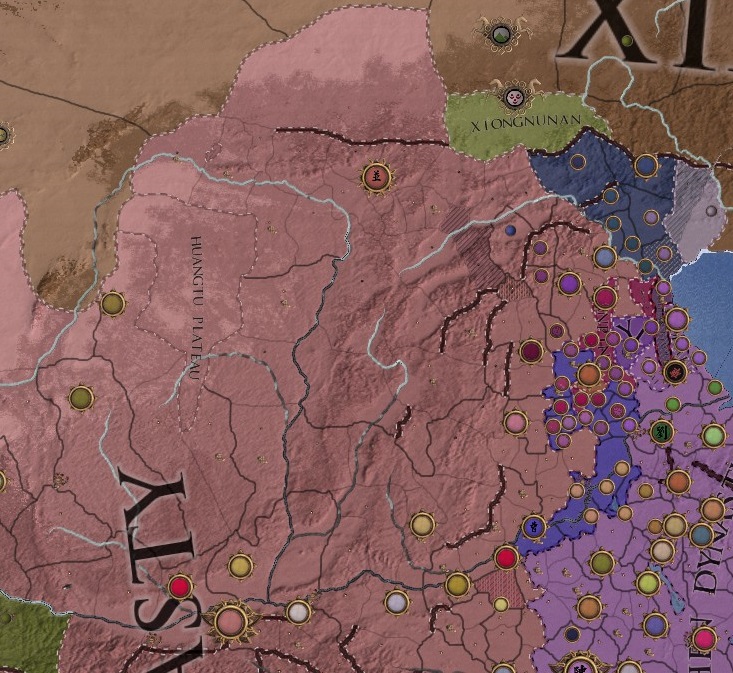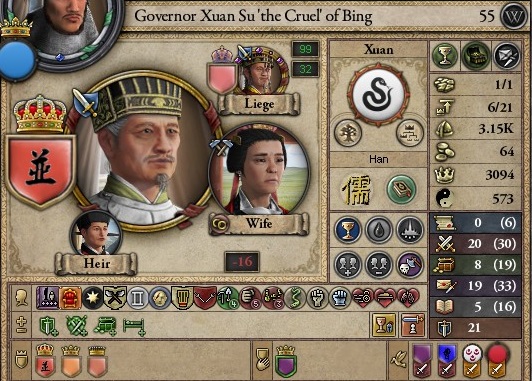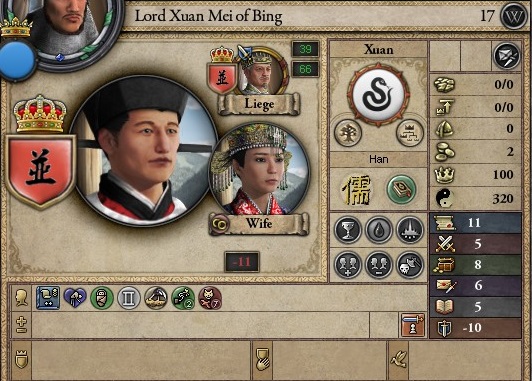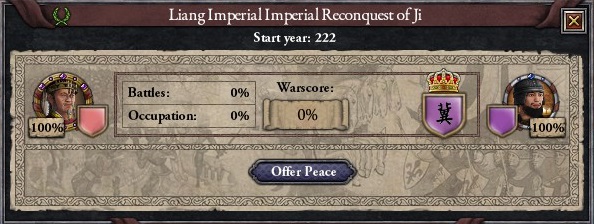222: ANWU VS CAO CAO
When he formed the Liang Dynasty,
Emperor Anwu’s plan to unify China was to conquer the bigger threats first, thus leaving the other warlords no other choice but to submit to him. He had started this strategy by invading Yang Province, which had proven to be a great success. But the creation of the Chen Dynasty and the pro-Han revolts led the Son of Heaven to reconsider his approach. The appearance of a dynastic rival changed the whole game, and he now needed to consider this carefully. Yes, he could probably conquer this new dynasty in one campaign, but this was not a certainty. Such war would be extremely costly for the Liang Dynasty, even if he won. This might leave the path open for a third player to rise up and seize the day. If Emperor Anwu was annoyed by the existence of a second dynasty, the appearance of a third would be enraging. Better to clean up the other warlords before duking it out with the Chen pretenders.
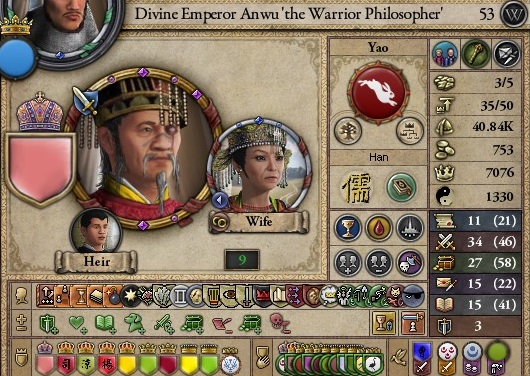
And the first warlord of that list was Cao Cao. In the last years of the Han, he had surprisingly expanded to the point of being the third biggest warlord in China. While the troops at his disposal were nowhere near that of the Liang (or the Chen), the genius of Cao Cao could surely compensate for this or any disadvantage that he faced. His surprising expansion was extremely frustrating to Emperor Anwu, considering that the man’s only claim to fame was a failed attempt on Dong Zhuo’s life 33 years ago. He spent most of his life since as a small warlord with little to no impact on China, someone who shouldn’t have become a problem. Yet here they were, with Cao Cao forming a literal wall between the Liang and the Chen. If someone was to ever form a third dynasty, it was this man. Which is why the Emperor needed to take him off the board as quickly as possible. In late January 222, the Liang Dynasty launched it’s campaign against Cao Cao, with the goal of claiming his lands for the Liang.
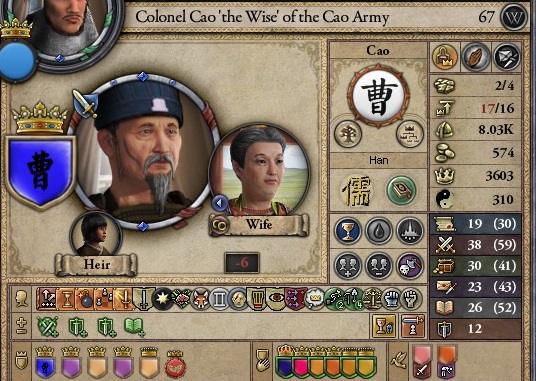
As he made preparations for the military campaign, Emperor Anwu received a written request from his Excellency of Works
Mo Jie. He was seeking a marriage for his new son Mo Duo and wondered if Princess Xiaoya was still available to remarry. Emperor Anwu thought this was some sort of joke. His favorite daughter was still betrothing Xu Chu’s son, after all. But it turned out that no, Mo Jie was genuinely asking for this betrothal to be annulled so that Yao Xiaoya could marry someone closer to her age. Surely this was an acceptable deal, right?
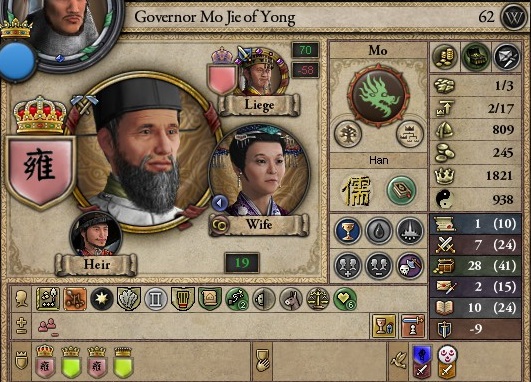
This enraged both father and daughter. The Emperor had allowed the adoption and pardoned Mo Duo, but this was too much. His daughter marrying a lowly barbarian, and a traitor at that? Unacceptable. And the princess hated the idea just as much. Already she was going to marry the son of a great general instead of the general himself, and now she should settle for an even lower marriage? There was no way she would allow this savage anywhere near her. Even Crown Prince Yuan, now sixteen years old, presented a petition at court condemning this insulting proposal by the Excellency of Works. Mo Jie tried to justify himself, being extremely confused at the controversy, but as always it only made things worst. By the time Emperor Anwu left Chang’an to go on campaign, Mo Jie had been removed from office and ordered to go back to his province, leaving the Imperial Capital humiliated. As for Mo Duo, he eventually married Bao Mingyue, daughter of a dead official from Yi Province named Bao Ming (a contemporary of Pan Zheng in the late 190’s).
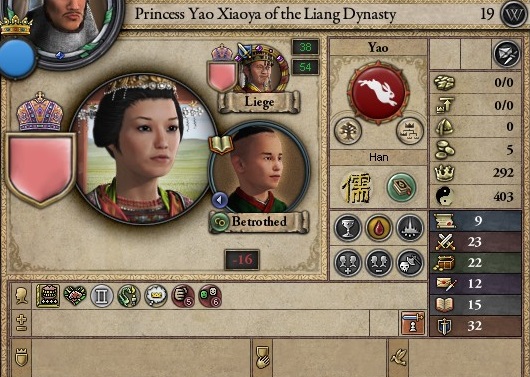
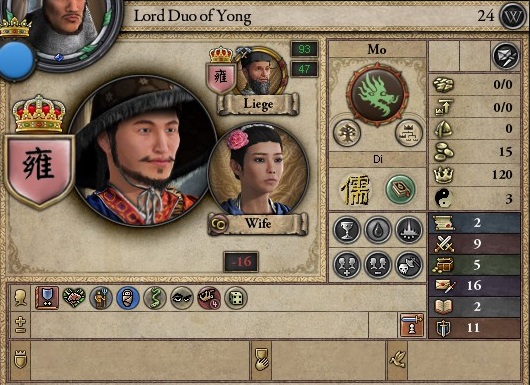
Believing that this campaign would be an easy war due to the size of the Liang army, Emperor Anwu decided to go take command of the troops himself as to shore up his prestige. The familial scandals, the rise of the Chen Dynasty and the pro-Han revolts had left a blemish on his new regime, which he now felt needed to be rectified. Another war just like that of the Yang campaign to show everyone that he was the true holder of the Mandate of Heaven. Of course, he also took by his side Xu Chu, his fastest rising general. In the three years since the founding of the Liang Dynasty, Xu Chu had become Marquis of Longxi, General who Manifests Might (a title he was once again given on this campaign) and Governor of Yi Province. Quite a career that seemed only to be waiting for a place among the inner circle of Chang’an.
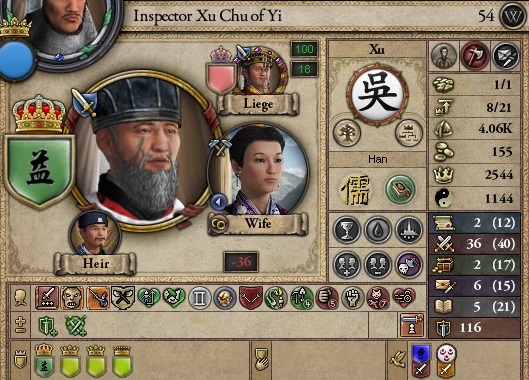
But the Emperor also ensured that some younger officers were brought on this trip as to build up a future generation of military leaders. Among those were the brothers Guan Tie and Guan Ping. Guan Tie, the second son of Guan Yu, had already been noticed by the Emperor, and had made sure that the young man served under him against Ba Daiping’s “coalition”. However, his older brother Guan Ping was also proving to be a competent military leader, though he lacked his brother’s skills to be anything else. Guan Ping now served as Administrator of Zhao Commandery, an office previously held by their father. While Guan Ping was considerably older than his younger brother (he was 43) and injured due to a hunting accident, he still had the potential of rising within the ranks if he did well on this campaign.
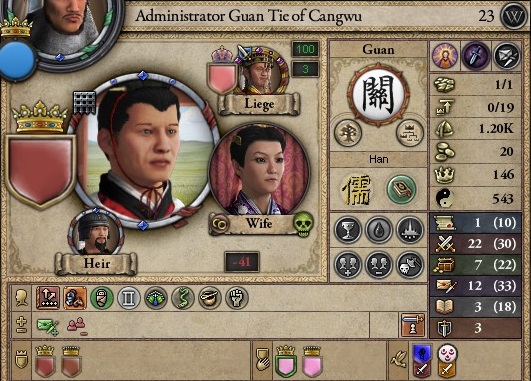
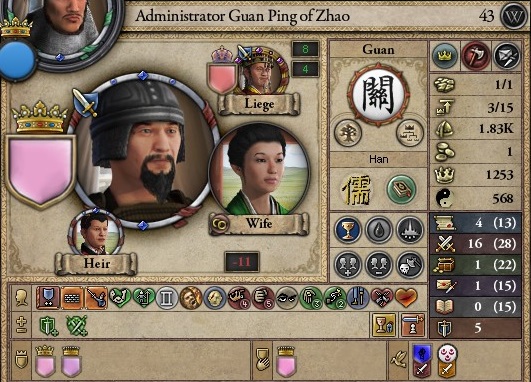
Ass the troops assembled, Emperor Anwu also took a good look at his Crown Prince and became worried. Clearly Yao Yuan was not made of the same mold as he was. Understandable, considering that he spent his life in army camps, while the Crown Prince spent his at court. The boy was learned, yes, and he did manage to make his way through court politics well enough. But he clearly lacked an understanding of the state. The multiple pathetic excuses used by the Crown Prince to avoid going on campaign only made the Emperor more worried about the future. Thankfully, he had prepared for this, and over the last few years he had written a book for his eventual successor, which he called “The Seven Founding Principles to Rule”. He hoped that this book would be useful to Crown Prince Yuan once he took the throne, and hopefully help him become a better monarch.
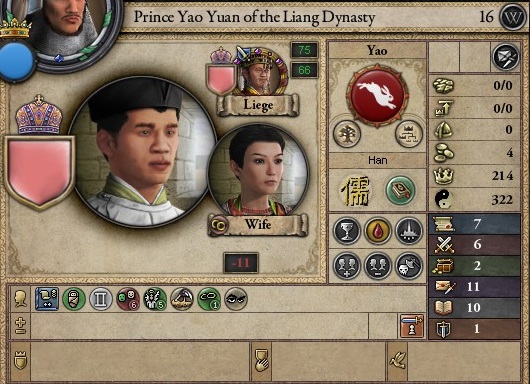

But while all these preparations were taking place, Cao Cao made an early move. Instead of attacking the center of the Liang Dynasty and move against a symbolic target like Luoyang or attack the rich Jing Province in the south, he moved toward the northern mountains of Bing. He planned o take the important fortified cities between Bing and Ji Province and force the Imperial Army to face him in disadvantageous situations, all while he pillaged Bing Province. Of course, news of this move did not sit well with
Xuan Su, the Governor of Bing Province. He might have been happy to let the Emperor and Cao Cao duke it out in the south. But now that his territories were threatened, he found himself forced to act.
Xuan Su immediately started to raise troop and prepare the defense of the mountain passes. He raised around half the number of troops under Cao Cao’s command. Xuan Su quickly took position in a mountainous pass that he believed defendable enough and prepared himself. Envoys sent to the Emperor to warn him of the enemy’s approach never came back, making Xuan Su fear that they had been captured by Cao Cao. All he could do was hope that the Imperial Army would arrive in time to assist him. The Cao army finally appeared in May, scouts reporting that it was camping close to their position. And no sign of Emperor Anwu…
_______________________
Xuan Su was sitting in the home he had requisitioned at the center of the village. Jingxing was a village situated on the hills that separated the mountains of Bing Province and the plains of Ji Province. A good position to stop the enemy from entering Bing Province. Even if they were defeated (which they would probably be without imperial support), they could retreat to the mountains and slow down Cao Cao’s advance.
“Cough! Heh…”
Damnit. He was coughing blood again. He felt frail as he continued to spit blood. Years of fighting a sickness that did not want to surrender had left him a pale shadow of the vigorous young man he once was. He was already stressed enough by the handling of his multiple schemes, but now he had to endure his weakening body. At least he still had enough strength to lead the defense.
“Cough!”
“Father!”
Xuan Lu came to his father’s side, but Xuan Su immediately shoved him off in anger. It was already humiliating to be in this state. Receiving help would be unbearable. And if the troops heard that he had become too old and sickly, then it might affect morale.
“Let me be!” he shouted as he pushed his son away in frustration.
Xuan Lu, taken aback by this, simply obeyed and took his distances. Honestly, Xuan Su didn’t understand why his son had even wanted to come. He knew that the boy was aiming for a promotion within the imperial bureaucracy, but there were other ways to do so than accompany him on this campaign. Xuan Lu had his place not in the army camps, but at court, where he could dress well and entertain others with his oratory skills. While he did like the mountains, it was only because it allowed him to interact with the barbarians. Xuan Lu was one of those young idealists who bought Mo Jie’s ideas of friendship and cooperation with the barbarians. While Xuan Su knew how to use the northern barbarians to his advantage, that did not mean he considered them his equals. With ideas like that, he had no place on the battlefield. But Xuan Lu was ambitious, and so insisted that this was the faster way to get the promotion he sought. And really, it was not like Xuan Su could tell him not to follow his ambitions.
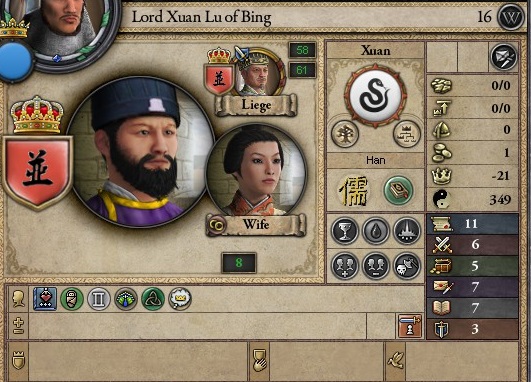
So Xuan Lu was present for the defense against Cao Cao. That was not the case of his oldest (living) son, however. If Xuan Lu felt at odds within the army, Xuan Mei would have been a source of ridicule. The hunchback had always been looked down by others, much to the annoyance of Xuan Su. But while he could see that his son had developed a tendency to avoid conflict because of this, he also noticed that Xuan Mei was taking pride in his lineage. Yes, he was a hunchback, but he was the heir of Xuan Su, the greatest man of China. And Xuan Mei was a decent enough speaker with some basis in administration. When Xuan Lu asked to join the defense, Xuan Mei instead offered to administrate Bing Province in his father’s absence. Xuan Su could only agree. If something happened to him, then at least Xuan Mei would be safe to retain all the power he had built (assuming that Emperor Anwu didn’t oppose it).
“Didn’t I tell you to go check the supply, Lu?” he finally asked after he finished coughing.
“I was but…”
Xuan Lu stopped himself, looking around at some of the other officers present. There was clearly something that none of them wanted to say, but someone needed to spit out. Xuan Su frowned. This only happened when they had terrible news for him. Knowing that none of them would come forward without a small push, Xuan Su decided to point of the officers out as to save his son from the embarrassment.
“You…. Cough! Heh… spit it.”
“Governor, we, hum… We caught deserters. A least three dozen of them.”
“By Heaven, can things get any worse?” Xuan Su complained.
“We still have no news from his Imperial Majesty and the Grand Imperial Army.”
Xuan Su glared at the officer who was stupid enough to answer this open question. He sighed and took a moment to think.
“The deserters.”
“Y-Yes?” one officer answered.
“Cough! Cough!... Are they still alive?”
“We have them in custody, father.” Xuan Lu explained.
“We can have them flogged whenever you give the order.”
“Flogged? No, no, no. We won’t flog them.”
“We could hang the ring leaders.” one officer suggested.
“Lingchi. All of them.”
“Governor?”
Looking at the confusion in their eyes, Xuan Su grunted in annoyance.
“Death by slow process. The lingering death. The death by a thousand cuts. Doesn’t that ring a bell? Anyone?”
“Father… All of them?”
“Yes.” Xuan Su answered.
“B-But Governor. We need every man available.”
“Which is why we better give the soldiers a taste of what awaits them if they try to desert.”
“But… hum… how should we even process doing this?”
“You cut the arm, then the body, always avoiding vital points! I’m not asking you to write a thesis on Confucius, I’m asking you to kill a man! SO GET TO IT!”
“Y-Yes!”
“Wait.” Xuan Su ordered before most of them left.
“If the men start protesting too much, just execute the deserters. I want to convince the soldiers to stick around, not drive them into mutiny.”
“Yes, Governor!”
The officers left to go prepare the executions, with only Xuan Lu staying behind. There was going to be a lot of screams in the camp for the days to come. Maybe even enough to drown the sounds of his awful cough. He was in the middle of one of these bloody coughs when a man in uniform entered the building and fell to his knee.
“Governor!”
“Cough, cough! What now?”
“Cao Cao sent an envoy! He gave us a letter for you.”
The soldier presented a bamboo scroll, which Xuan Su coldly snatched out of his subordinate’s hands.
“Leave me.” he ordered the soldier.
“Yes!” the man said before making his hasty exit.
Xuan Su started to read the letter in silence. It was a safe decision, considering its content. His eyes grew wider as he took in the words written in the scroll. He had to admit it, Cao Cao knew how to make an enticing offer.
“What does it say?” Xuan Lu asked, the curiosity getting the better of him.
With a smile, Xuan Su simply answered:
“Cao Cao wants me to join him.”
“T-To betray the Emperor?” Xuan Lu asked, troubled.
“He wants us to join force. Once we defeat the Liang and split Ji Province, we would both stand as two of the most powerful men in China. He even wrote a rough strategy on how to achieve such victory.”
“What will you do?”
“Cao Cao clearly gave this idea some thoughts.” he said with a wicked smile.
“I should thus do the same.”
Joining Cao Cao and betraying Emperor Anwu. This idea certainly had value. If Cao Cao was as good as they said, then this might be doable. He would finally reclaim the power and independence he had been craving for all those years. Maybe he could even declare himself Emperor of his own dynasty. If this
Xiao Ru fellow could do it, then why no him. Yes… Emperor Xuan Su certainly had a nice ring to it. He had spent years trying to build his own powerbase in the north, and now he was given an opportunity to put it to good use.
But his eyes then noticed a red stain on the ground. Blood, his blood. His eyes then darted to Xuan Lu, and this sadly put everything back into perspective. Even if this betrayal succeeded, his declining health meant that he would probably not be the one handling what came next. Had it been ten, maybe even five years ago, he would have been confident that he could build a state from such betrayal and leave it stable enough for his sons. Now though… With Cao Cao and Emperor Anwu on his border (and that didn’t even account for the Xianbei Confederacy), his successful betrayal would only doom his family once he was gone. As much as it pained him to admit it, he needed to remain loyal. At this point, his own dreams would have to play second fiddle to the future of his Clans. If he could not achieve greatness, then he needed to make sure that his sons were in a position to do so. And this was not going to happen by pulling such a wild and dangerous betrayal.
“Burn the letter.” he ordered his son.
“Never mention its content to anyone.”
“Should we send a reply to Cao Cao?” Xuan Lu asked.
“Why?” Xuan Su answered with a grin.
“The doubts over my loyalty may be our only advantage, so why waste it?”
_______________________________________
But whatever advantage Xuan Su hoped to gain proved useless. Once Cao Cao and his generals realized that Xuan Su wasn’t going to switch side, they launched their assault. They spent the first two days harassing the defenders. While it resulted in minimal casualties, it certainly affected the morale and the resources of Xuan Su’s soldiers. Some Cao soldiers even managed to make their way in Jingxing and destroy the granary. Now doomed to starve if things didn’t improve, the defenders were made aware that Cao reinforcements had blocked their escape route After two more days of waiting, Cao Cao ordered the conquest of the city.
The fighting was ferocious, but the sickened Xuan Su knew that they were doomed. At least until his men came to him with tears in their eyes. They screamed: “The Emperor! The Emperor is here!” And indeed, as he looked down on the plains, he could see the massive Liang army, led by Emperor Anwu himself. Now caught between Xuan Su’s forces and the far larger imperial army, Cao Cao found himself trapped. Just as the Emperor had planned. He quickly ordered XU Chu to launch a daring charge on the enemy, followed by a relief effort from the rest of the troops. Xuan Su and his men were broken out of their encirclement, and now victory seemed certain.
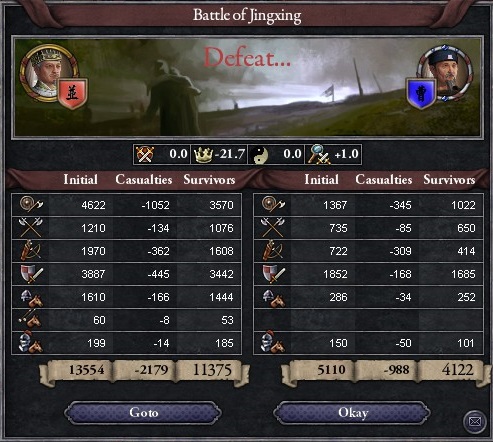
What happened then? They had the numbers, the defensive advantage, the knowledge of the terrain, and great commanders to win the battle. So why did this become the greatest defeat of Emperor Anwu’s entire life? Well, there were many factors. Cao Cao had planned for this and prepared accordingly. Xu Chu, while a great commander, was not the best tactician. The Liang army was divided between the task of defeating Cao Cao and breaking free the encircled troops of Xuan Su. But really, one of the main causes of this failure was the overconfidence of the Emperor. His whole life had been nothing but success after success, victory after victory. By now, this had led him to become somewhat arrogant about his military capabilities. The idea of actually meeting a match on the battlefield never even crossed his mind. For him, Cao Cao, while competent, did not compare to him. No one compared to him. So this defeat proved quite the reality check for the Emperor.
But he was not the only one to be shocked by this turning point. For many across China, this brought into question the legitimacy of the Liang Dynasty itself. After all, a clear sign that one held the Mandate (and the favor) of Heaven was victory on the battlefield. While it was clear that Emperor Anwu had previously been favored by Heaven, considering his unification of more than half of the Han territories, this embarrassing defeat opened the door to a simple question: did he still hold the Mandate. The Chen Dynasty was quick to answer with an enthusiastic no, even as it was struggling with a civil war within its borders. But a large group of peasants reached the same conclusion, rising in revolt close to the site of the battle. Obviously, this revolt was only possible thanks to a hefty amount of support from Cao Cao.
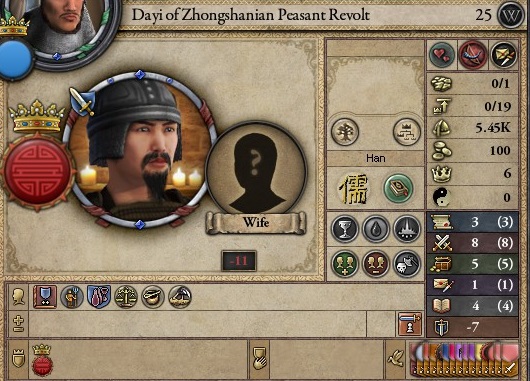
Xuan Su had a plan on how to salvage this debacle. Yes, they had lost, but they shouldn’t focus on that. Instead, they should promote his defense of Jingxing and the ability of the soldiers to resist the invader. They didn’t fail to push back the enemy; they stalled its dangerous advance. This ought to be celebrated! Emperor Anwu loved this spin on the facts, but he hated that it meant rewarding Xuan Su. Still, this proved the best victory he could hope for, so he agreed with the propaganda idea. For his efforts, Xuan Su received two rewards for his sons. Xuan Lu was given the promotion he had always dreamed of, as he was soon appointed Magistrate of Leiyang. This appointed in the south of Jing Province was a move on the Emperor’s part to distance the Xuan Clan from their home in Bing Province, which he hoped would weaken their powerbase.
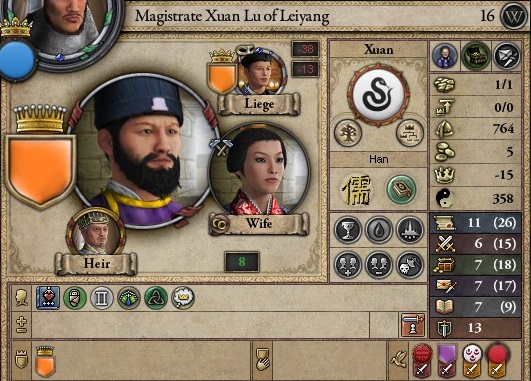
The second reward was a betrothal between Xuan Zian, Xuan Su’s third oldest living son, and Princess Ki, the Emperor’s oldest child. Yao Ki had been widowed a year ago and was still young enough to produce children (she already had four, including her bastard son with Hu Cheer). Unlike her sister Yao Xiaoya, Yao Ki was happy at the prospect of marrying the young son of such a powerful governor. She certainly saw the advantages that could come from this, both for her and her now fatherless sons. But while the marriage would take place, it would prove an unhappy one. Xuan Zian would never been keen on his older wife, and the lack of children from their union led to rumors that he shunned his wife’s presence as much as possible.
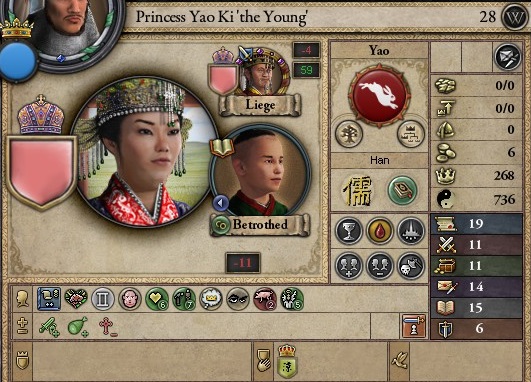
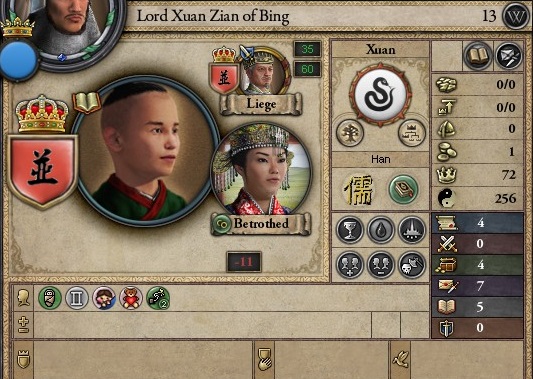
But the propaganda and the rewards did nothing to improve the situation in the camps. Morale among both soldiers and officers was low after the defeat at Jingxing. While Xuan Su and the likes tried to enforce strict military discipline, Emperor Anwu tried to give his soldiers some leeway as to give them a chance to recuperate. Except these looser standards came just as an epidemic of slow fever erupted in the camp. The disease cost the lives of a few hundred men, including the promising young officer Guan Tie. Emperor Anwu had singled him out as a promising example of the future generation of Liang officers. Now he was dead at the age of 24.
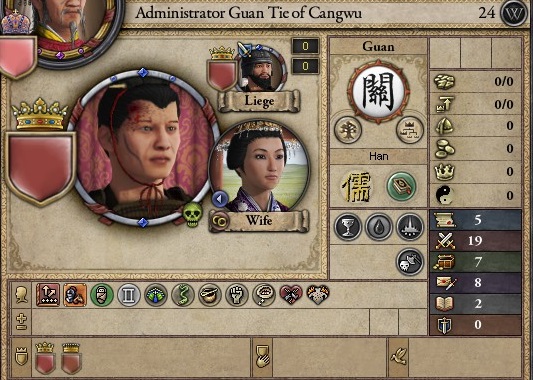
But all these depressing developments were turned upside down by unexpected news in June. Cao Cao was dead. The victory at Jingxing would prove his last trick, and he died in the first weeks of June at the age of 67. The problem (at least for Cao Cao’s supporters) was that almost every single one of Cao Cao’s son had preceded him in death. Because of this, his succession was never fully settled, leaving the whole question up in the air when he died. His generals quickly abandoned the campaign and retreated to Dong Commandery and declared the only son of Cao Cao as their leader. But Cao Mang being only a year old, this meant that the generals would be the ones running the show.
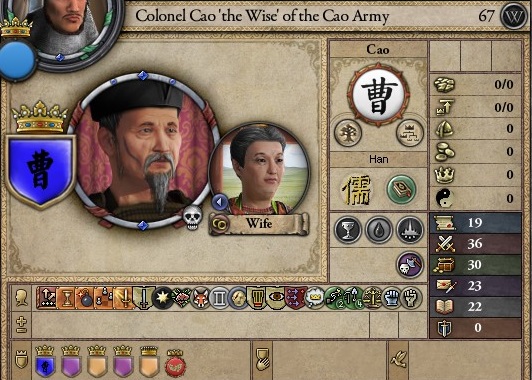
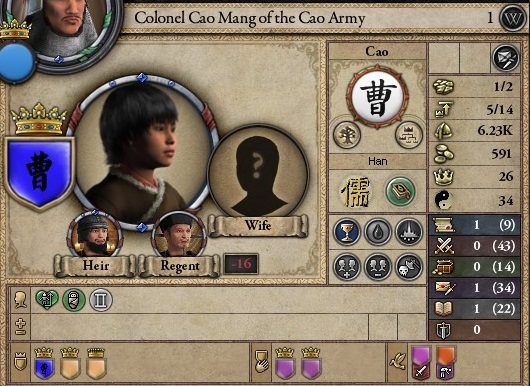
Yet not everyone in the family agreed with this. Since the generals had brought their whole forces in Dong Commandery, the rest of the territories controlled by Cao Cao found themselves without support from the army. This left many civilian officials frustrated, a frustration that was exploited by Cao Xi. Cao Xi was the result of the marriage between Cao Ang, Cao Cao’s eldest son, and Lü Bu’s daughter when the two warlords formed an alliance against Gongsun Zan. As the eldest son to the eldest son, Cao Xi had a lot of reasons to expect to be the next heir. When he wasn’t, the competent young men took things into his own hands. He managed to seize the Julu and Qinghe Commanderies, which represented two thirds of his father’s territories.
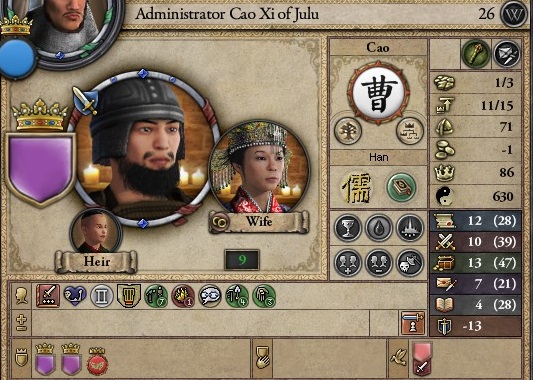
And then there was the third Cao heir: Cao Fang. Cao Fang was something of an anomaly, mostly because he was neither the son nor the grandson of Cao Cao. He was instead the son of Cao Ren, a distant cousin of Cao Cao and one of his key generals. But Cao Fang was not with his father when Cao Cao died; he was in control of the city of Julu. Realizing that the situation could allow him to make his own path (and that he had more troops in his county than Cao Xi in his two commanderies), Cao Fang refused the authority of Cao Mang or Cao Xi. He now saw himself as a new independent warlord, free to achieve his own ambitions.
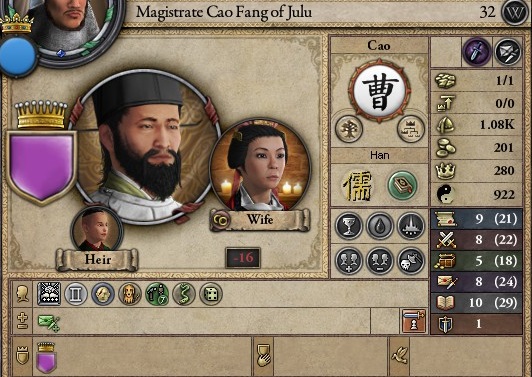
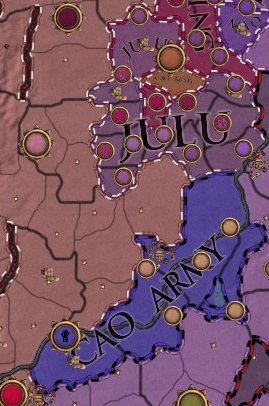
This proved a welcomed development for Emperor Anwu, who only weeks before was facing the full might of Cao Cao. With most of the Cao troops serving under Cao Mang, the Emperor decided to turn his attention on the other two. He quickly dispatched an envoy to Cao Fang and convinced him that he would recognize him as the true heir of Cao Cao in exchange of his submission. Seeing this as a way to preserve his territory and hoping for further advancement, Cao Fang agreed. With him neutralized, this left the massive target that was Cao Xi. If Cao Xi was defeated, then this whole campaign could be salvaged. In late June 222, Emperor Anwu announced that soon they would be reclaiming Ji Province, starting with the lands held by Cao Xi.


